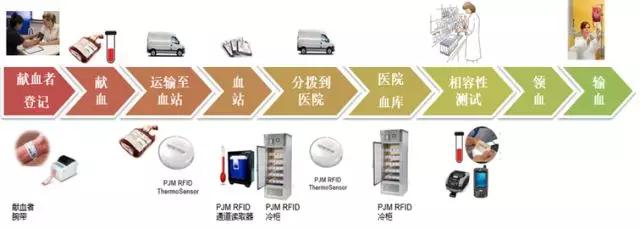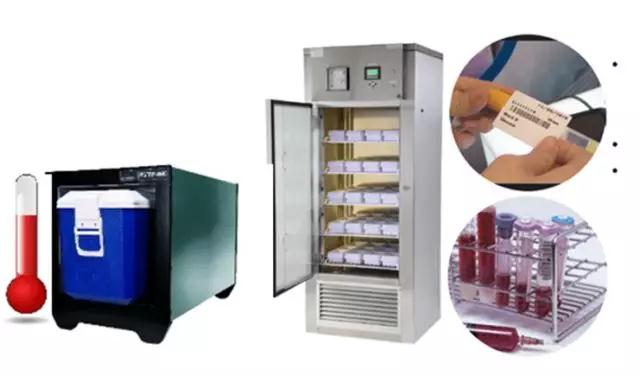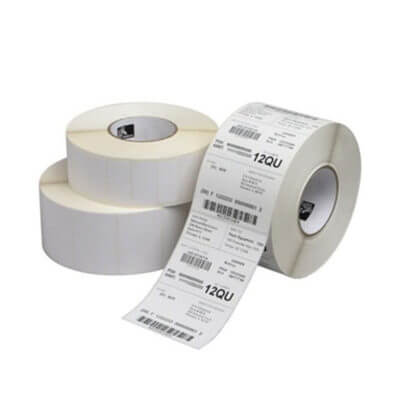SATO’s unique PJM RFID is the only RFID technology that complies with ISBT standards and can be used to optimize the blood collection, supply and transfusion supply chain. The application of PJM RFID in blood management will be described in detail below.
1. Background
With the development of RFID technology, its reliability and cost are sufficient to support the application of supply chain optimization management in more industries. The International Society of Blood Transfusion ISBT*1 (The International Society of Blood Transfusion) began to comprehensively analyze the results of RFID experiments in 2006, drafting and formulating recommended guidelines and corresponding standards for the application of RFID in blood transfusion medicine. The ISBT standard guidelines clarify the purpose of RFID in blood transfusion medicine:
- 1) Improve patient safety
- 2) Improve the efficiency of the medical supply chain
The scope of application covers the entire blood product supply chain from blood bag production to blood donors to patients.
ISBT has fully verified the application of RFID in the field of blood transfusion medicine, and fully considered the consistency and compatibility of the implementation with related industries.
*1: ISBT International Association for Blood Transfusion is a non-profit international academic organization established in 1935 with the goal of promoting research in blood transfusion medicine. The Institute is headquartered in Amsterdam, the Netherlands, with more than 95 countries participating.
02. Challenges in blood transfusion management
- 1) The rapid growth of clinical blood demand has caused a shortage of blood supply
- 2) The blood is transported and stored under non-permissible temperature conditions
- 3) Poor management of deadlines, causing blood to be discarded and wasted over time
- 4) Inability to remotely control inventory in real time, and to implement refined management of blood collection, distribution and scheduling.
03.PJM RFID blood transfusion management solution
SATO’s PJM RFID (Phase Jitter Modulation)
is an HF technology that complies with the ISO18000-3 Mode 2. It is not afraid of liquids and metals, and can be operated and stored at a low temperature of -40°.”
Application of PJM RFID in blood transfusion management:
SATO provides a solution to optimize the supply chain of blood collection, supply and transfusion based on PJM RFID technology, covering blood donation management–blood processing management–detection–blood storage- -Blood distribution—a series of process management for patients’ blood transfusion, which saves a lot of time, cost and wastage on the whole, and ensures the “safety, accuracy, and traceability” management of blood.
Every time in and out of the warehouse, blood products (blood cells, platelets, plasma) are easily exposed to non-permissible temperatures; barcode scanning in the processes of receiving, warehousing, picking and delivery is time-consuming and laborious, and the chance of loss is also Large; real-time positioning and tracking is not possible, and manual inventory of blood is time-consuming and laborious.

The process application is shown in the figure
- 1) Use wristband/barcode identification label to register blood donor information.
- 2) The ISBT code number is marked on the collected blood bag and sampling tube, and the blood bag is loaded in a cold box with a temperature sensor label and transported to the blood station.
- 3) The PJM RFID channel reader reads the blood bags in the stacked cold box at one time, eliminating the need to scan the barcode of each blood bag, reducing the time of exposure to room temperature.
- 4) The PJM RFID channel reader reads the historical temperature of the inventory and the cold box; the blood center can decide whether to discard the blood bag based on the temperature record.
- 5) After the blood station extracts/separates and processes the blood, it is sorted and stored in a PJM RFID freezer, or distributed to the hospital. PJM RFID freezer can not only provide real-time and accurate inventory, but also locate and track, find designated blood products, and avoid taking blood by mistake and sorting out expired blood from the refrigerator.
- 6) Hospital blood banks use PJM RFID readers and refrigerators to receive and store blood products.
- 7) Conduct cross-matching tests in the laboratory, and use SATO printers to print compatibility labels (antibacterial labels).
- 8) In the blood transfusion link, the mobile printer PW208NX and handheld devices are used to input nurse and patient data and print sample labels after blood samples are collected to realize end-to-end visualization.
SATO PJM RFID products
The advantages of PJM RFID blood transfusion management solution:
- 1) Non-contact identification technology can quickly identify products and reduce blood pollution and temperature effects.
- 2) Mark the effective date of blood, and set automatic scrap alarm in inventory management to reduce blood waste.
- 3) Temperature recording and automatic data access to ensure blood safety.
- ◎Temperature record during transportation, to grasp the temperature control status.
- ◎Time stamp and automatic recording of all activities, can grasp how long to leave the freezer, frost time, etc.
- 4) Realize real-time tracking of the blood supply chain and improve the overall management efficiency.
- ◎It can remotely monitor the off-site inventory withdrawal in real time.
- ◎Real-time control of inventory information can correspond to the scrapping and recall requirements of hospitals or blood stations.
- ◎Allow the central blood management agency to perform real-time control and allocate mobile local blood stocks for emergency response.
- ◎It can provide patients with the best blood supply.
- 5) End-to-end visibility including RFID printing.
—Solve problems related to donor traceability and exclude unqualified donors.
04.PJM RFID complies with ISBT RFID standard
Many countries in the Asia-Pacific have approved and accepted the test, and the results are quite successful.
PJM RFID is the only RFID technology that complies with ISBT standards and can be used to optimize the blood collection, supply and transfusion supply chain (see pages 23 and 24 of the 2010 edition of VOX Sanguinis)
The following table shows that PJM RFID technology is fully compliant with ISBT standards:
| ISBT RFID standard regulations | PJM RFID technology |
|---|---|
| ISO 18000-3, 13.56 MHz | 18000-3 mode 2, 13.56 MHz |
| 2K bit memory capacity and locking function | 4K bit memory capacity and locking function |
| Withstand centrifuge (up to 5000 grams, 22 minutes) to separate | PJM RFID can pass this process |
| -40°degree working environment | Support storage and operation in -40° environment |
| ISBT-128 format encoding capability | Support |
| Anti-collision | Anti-collision, can read up to 1000 tags per second |
| Gamma ray sterilization up to 50 grayscale | Support |



